The topic of water choice for infant consumption is fraught with various opinions and beliefs. One common query that has sparked numerous debates among caregivers worldwide is the safety of distilled water for babies. In the article, we aim to unravel the complexities surrounding this topic, providing a clear and comprehensive analysis grounded in scientific evidence.
We will delve into what distilled water is, its potential benefits and drawbacks, and the recommendations put forth by pediatricians and nutritionists. Our purpose is to equip parents and caregivers with the knowledge they need to make informed decisions about their baby’s hydration.
This article seeks to satisfy your curiosity, resolve any misconceptions, and offer a balanced perspective on the use of distilled water for babies. Whether you’re a new parent or an experienced caregiver, we trust that you will find this discussion enlightening and useful.
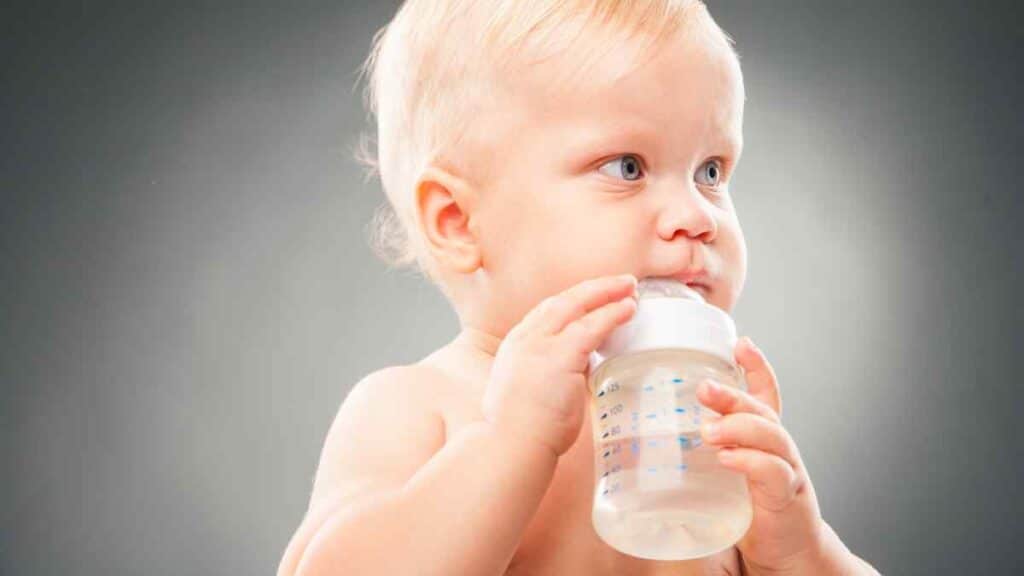
Are Distilled Water and Purified Water the Same?
As we navigate the world of parenthood, one question that often arises is about the right type of water to use for our little ones. In the quest for the best hydration source, we often find ourselves tangled in the debate of distilled water vs. purified water for our babies. So, are distilled water and purified water the same? And more importantly, what’s the best choice for your baby?
First, let’s understand the basics. Tap water is the most readily available source of drinking water. However, it may contain certain minerals, fluoride, and other substances that may not be suitable for babies, particularly when used in infant formula. This leads us to explore other alternatives like bottled water, which includes both purified water and distilled water.
Purified water is treated to remove all chemicals and pathogens, making it safe for drinking. It can be derived from any source, including tap or groundwater, and undergoes a purification process like reverse osmosis, distillation, or deionization. On the other hand, distilled water is a type of purified water, but it goes through a specific process of distillation that involves boiling water and collecting the steam, which leaves behind nearly all of its impurities.
The main difference between purified and distilled water lies in the processing and the degree of purity. While both are deemed safe for adult consumption, when it comes to baby’s formula, the choice isn’t as straightforward.
For preparing baby formula, many parents wonder whether it’s safe to use distilled or purified water. Both these types of water are free of impurities, making them a seemingly ideal choice. However, distilled water, due to its complete lack of minerals, might not be the best option for continuous use since babies need these minerals for their growth and development.
So, can babies drink distilled water by themselves? While it’s not harmful, it’s generally recommended to use it sparingly and not as the primary source of water, especially for younger infants. Can babies have purified water, then? Yes, they can, but it’s advisable to use purified bottled water labeled as “nursery water” or “baby water,” which is specifically processed with the right mineral content suitable for babies.
When it comes to nursery water vs. distilled water, nursery water often contains low levels of fluoride (unless it’s labeled as fluoride-free) to help build healthy teeth, while distilled water is fluoride-free. If you prefer to stick with tap water, boiling tap water can be an effective way to kill any bacteria or pathogens; however, it will not remove other impurities or fluoride.
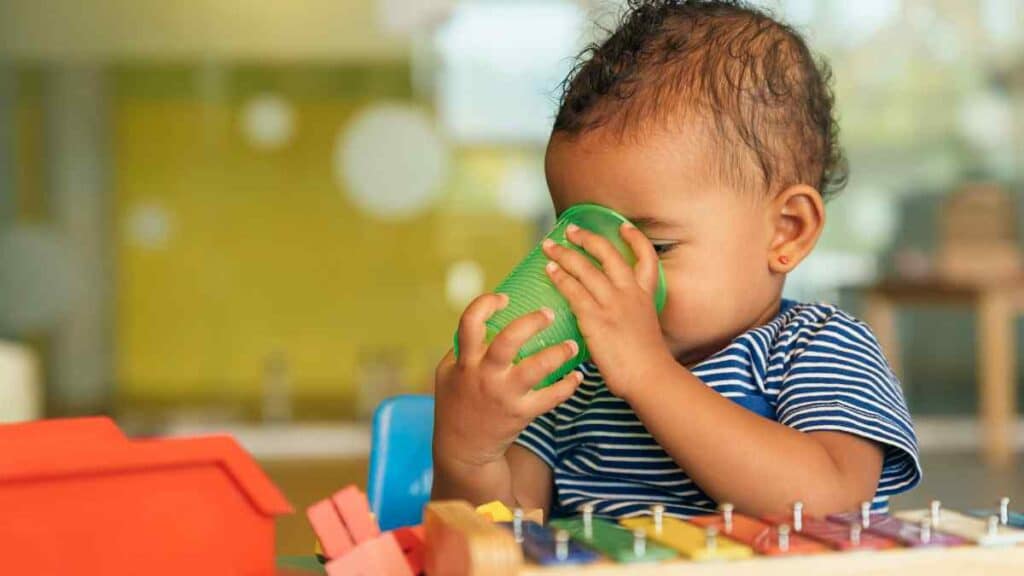
Tap Water vs. Well Water vs. Distilled Water for Babies
In the wide spectrum of water choices available today, three types commonly discussed are tap water, well water, and distilled water. Each carries its own set of pros and cons, especially when it comes to preparing infant formula. Let’s dissect each one of these water types to understand their differences, safety, and suitability for babies.
Tap Water: Accessible and Treated
Tap water is often the go-to source for many households, primarily due to its easy accessibility and regulation by local water agencies. It’s typically treated to eliminate bacteria and other harmful substances, and it may contain added fluoride beneficial for dental health. However, the mineral content and purity can vary depending on your local source, making it essential to regularly test its quality.
When it comes to baby’s formula, boiling tap water is often recommended, especially for newborns under six months. Boiling helps kill any remaining bacteria that could harm the baby. However, tap water’s fluoride content, while beneficial in appropriate amounts, can be a concern if overconsumed.
Well Water: Natural But Needs Testing
Well water is often considered a more ‘natural’ source, with many people appreciating its lack of processing and chlorination. However, it’s important to note that well water’s safety and suitability for drinking purposes, let alone for preparing baby formula, heavily rely on regular testing. It can contain a variety of contaminants, such as bacteria, heavy metals, and nitrates, which could pose health risks.
For infants, unless well water is adequately tested and treated, it might not be the safest choice. And similar to tap water, boiling well water before using it for baby’s formula preparation can eliminate bacterial risks.
Distilled Water: Pure, But Lacks Minerals
Distilled water is known for its high degree of purity, achieved through a process that involves boiling water and collecting the resulting steam. This process leaves behind almost all minerals and impurities, making distilled water a popular choice for those seeking a pure form of water.
Distilled water can safely be used to prepare infant formula; however, it’s important to note that it lacks essential minerals. Therefore, using it continuously might not be the best option, as these minerals contribute to a baby’s growth and development. Bottled distilled water is a convenient choice but always check for any additives that might not be suitable for babies. Let’s take a closer
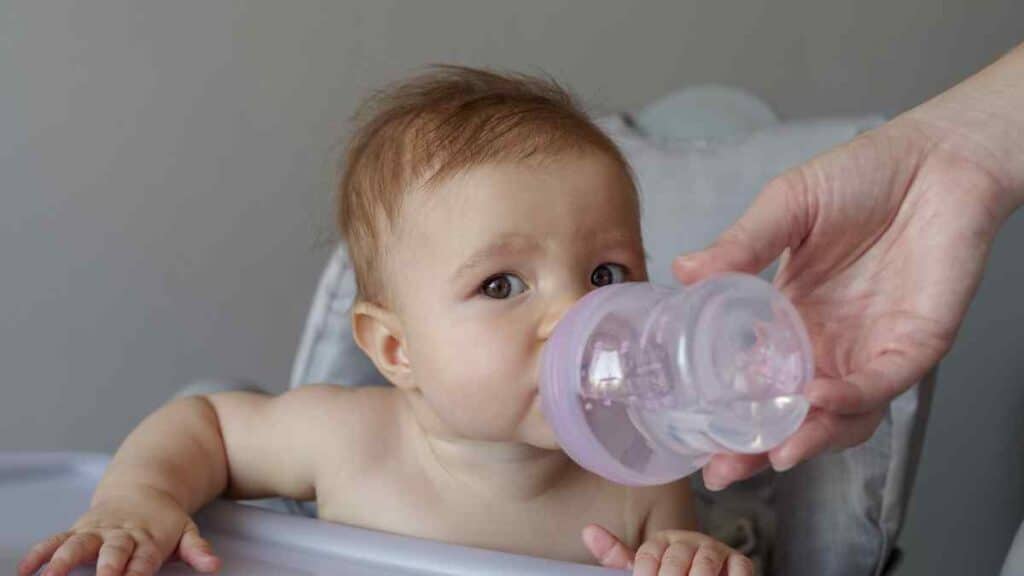
Is It Safe to Use Distilled Water for Your Baby?
Besides breast milk, many pediatricians consider distilled water to be among the safest water sources for a baby, especially if breastfeeding for more than six months. It’s also one of the purest forms of water, primarily produced by the steam collected once it reaches its boiling point. It’s then cooled off until it transforms to liquid, ensuring that 99.99% of harmful germs and impurities are removed.
Distilled water is an even better alternative to tap water, mainly because the distillation process eliminates various minerals, including fluoride. Most tap water sources contain fluoride, a mineral that, if exposed in high amounts, could cause your child to develop white lines on their teeth. Meanwhile, to address your child’s need for fluoride, your child’s doctor would advise you to get fluoride supplements to prevent tooth decay.
Many bottled baby water brands these days are made especially for infants. These companies follow strict guidelines to ensure the water goes through a boiling sterilization process before being bottled.
Understanding the Water Distillation Process
In our quest for clean, safe water, one of the options we often come across is distilled water. It’s touted as one of the purest forms of water available for human consumption, but what exactly makes it so pure? The secret lies in the water distillation process.
The Distillation Process
At its core, water distillation is a simple process. It begins with boiling tap water or water from any other source. As the water boils, it turns into steam. This steam then rises and is directed into a cooling chamber, a process known as vapor distillation [1].
In the cooling chamber, the steam condenses back into a liquid state – this is our distilled water. The impurities and contaminants that were in the original water source don’t evaporate with the water; hence they get left behind in the boiling chamber.
This is why distilled water is often referred to as one of the purest waters available. It has been stripped of not just possible contamination, such as bacteria, viruses, and chemicals, but also minerals that are naturally present in water.
Distilled Water vs. Purified Water
While all distilled water is purified, not all purified water is distilled. Purification refers to any process that removes impurities from water. This can include methods like filtration, reverse osmosis, or even the use of chemicals.
Distilled water, however, goes through a specific purification method – distillation. It’s worth noting that while distilled water is devoid of minerals and most contaminants, purified water may still contain some minerals, depending on the purification process it went through.
Distilled Water for Different Populations
Distilled water has various uses, and its ultra-purity makes it particularly suitable for certain populations and situations.
For instance, it’s often recommended for formula-fed young babies. This is because tap water, particularly from private wells or municipal water supplies, might contain contaminants that are unsafe for this vulnerable population. Distilled water can offer peace of mind as it’s free from these possible contaminants.
Pregnant women, people with compromised immune systems, and those who live in areas with poor water quality might also benefit from using distilled or spring water.
Moreover, distilled drinking water is also handy to have in a diaper bag for emergency clean-ups, as it’s free from potential irritants found in other types of water.
Potential Downsides of Distilled Water
While distilled water is very pure, this comes with a downside: it lacks the minerals found in other water types, such as spring water or mineral water. For most adults, this isn’t a problem, as a varied diet should provide all the necessary minerals. However, for infants or those with a limited diet, this might be a consideration.
It’s also worth noting that while fluoride can be a concern for young children’s developing permanent teeth, its complete absence in water can also be a disadvantage. Fluoride in drinking water, in the right amounts, helps prevent tooth decay.
Finally, it’s possible to drink too much water, leading to a rare but serious condition called water intoxication. While this is unlikely with normal water consumption, it’s something to keep in mind.
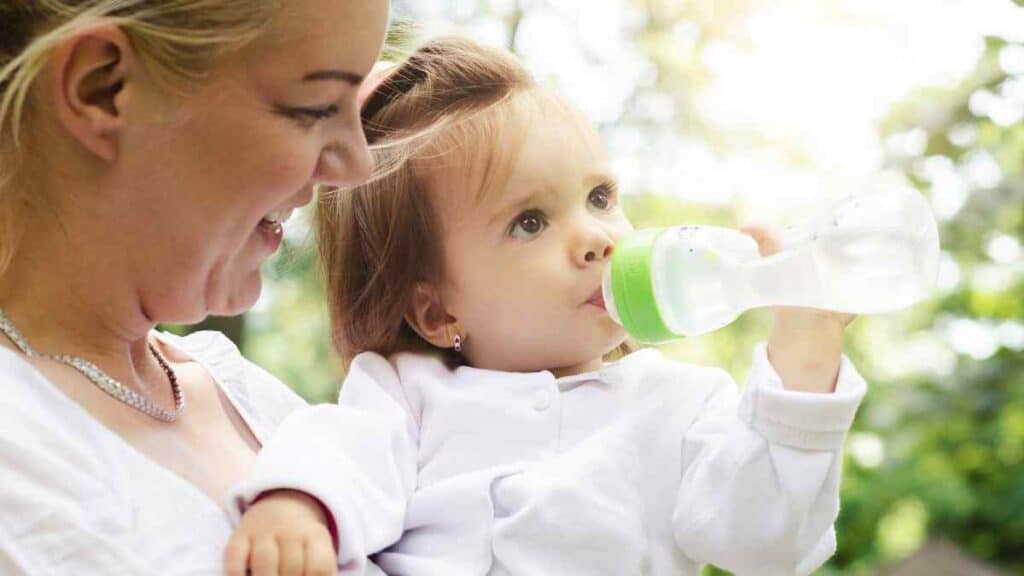
Should You Use Distilled Water for Babies?
Distilled drinking water is created through a process that involves boiling water to create steam and then cooling the steam to produce water. This process eliminates bacteria, viruses, and most contaminants, including beneficial minerals, making distilled water one of the purest forms of water available. But should you use it for your baby?
Distilled Water for Baby Formula
In general, it’s safe to use distilled water to prepare baby formula. It’s especially useful if you’re unsure about the quality of your tap water or if your tap water has a high content of dissolved solids or fluoride. Distilled water can provide peace of mind as it’s free from impurities. However, because the distillation process also removes beneficial minerals, it may not be the best choice for continuous use.
Distilled Water vs. Purified Water for Baby
Purified water goes through a treatment process – like reverse osmosis, filtration, or deionization – that removes impurities. So, while all distilled water is purified, not all purified water is distilled. Both types are generally safe for babies, but purified water may contain some beneficial minerals, depending on its source and treatment process.
When comparing distilled or purified water for your baby, it’s best to consider your baby’s specific dietary needs. For example, if your baby is only formula-fed, using distilled water lacking minerals shouldn’t be a problem because baby formula is already fortified with the necessary minerals.
How Much Fluoride Is Safe?
One common concern is fluoride content in water used for baby formula. Fluoride is often added to tap water and is good for dental health in the right amounts. However, excessive fluoride in early childhood can lead to dental fluorosis, a harmless cosmetic condition affecting the appearance of teeth. Using distilled or purified water with low or no fluoride to mix baby formula can help control how much fluoride your baby gets.
Other Drinks for Babies
For older babies who are consuming a variety of foods, drinking distilled drinking water in moderation should be fine. Keep in mind that babies should primarily drink breast milk or formula for their first year. After that, cow’s milk, small amounts of fruit juice, and water (including distilled) can be gradually introduced.
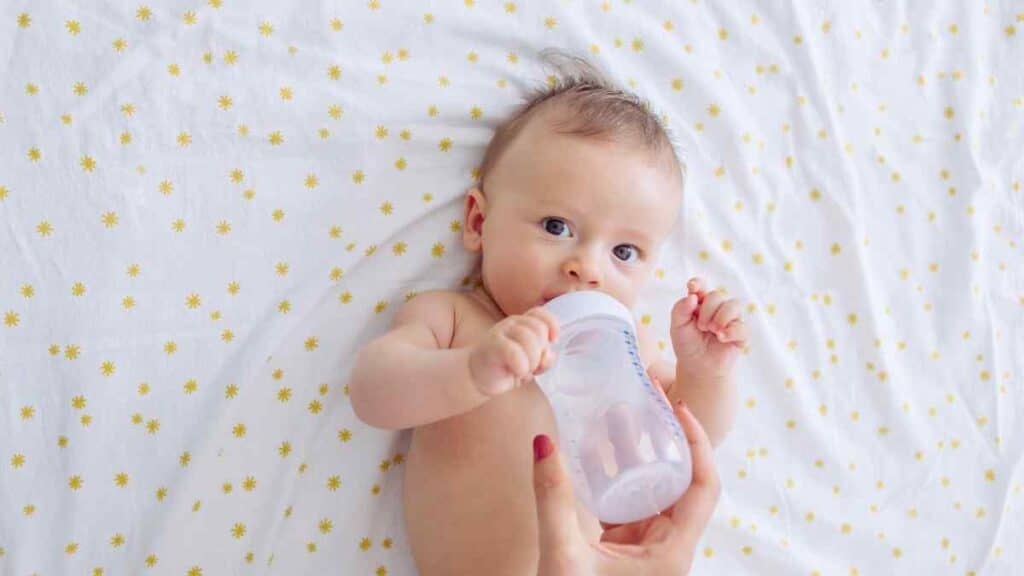
Why is Distilled Water Recommended for Baby Formula?
When it comes to preparing baby formula, the quality of the water you use is as crucial as the quality of the formula. A common recommendation is to use distilled water, but why is this type of water often singled out as the best for this purpose?
Distilled Water for Baby Formula
The primary reason purified or distilled water is recommended for baby formula is its purity. When you’re feeding a newborn or young infant, you want to introduce as few potential contaminants as possible.
Distilled bottled water can be particularly useful if your tap water, or municipal water, has a high mineral content or if you have a water softener. Water softeners often replace hard minerals with sodium, which isn’t ideal for infants.
Another advantage of distilled water is that it’s free of fluoride. While fluoridated water is beneficial for older children and adults in preventing tooth decay, it can lead to dental fluorosis in infants if consumed in high quantities.
Distilled vs. Purified Water
While all distilled water is purified, not all purified water is distilled. Purified water means it has undergone some purification process—such as reverse osmosis, carbon filtration, or ozonation—that removes impurities, making it safe for drinking.
Distilled bottled water is considered one of the purest forms of water because the distillation process is highly effective at removing contaminants. However, it’s essential to remember that both purified and distilled water are safe for babies, and the best choice may come down to personal preference, convenience, or specific dietary needs.
Other Considerations
Although distilled infant water is often recommended for baby formula, it’s crucial to consider the overall dietary intake of formula-fed babies. Because distilled water lacks minerals, if it’s used exclusively for formula preparation, make sure your baby’s formula contains all the necessary minerals your baby needs for healthy growth and development.
Lastly, while distilled bottled water is a safe choice, it’s always a good practice to boil water for baby formula to ensure any remaining bacteria are eliminated, especially for newborns and infants under six months.
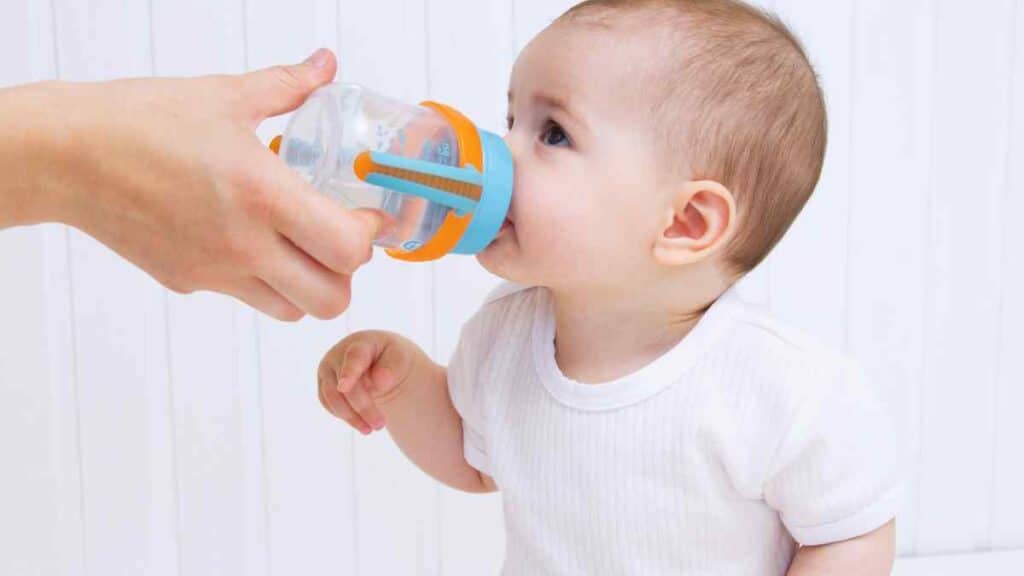
Is Mineral Water Good for Your Baby?
As we’ve explored the various types of drinking water for babies, you may wonder if mineral water is the best choice for your little one. In this column, we will delve into the benefits of mineral water and how it compares to other options like tap water, spring water, and purified drinking water.
The Food and Drug Administration (FDA) regulates bottled water, ensuring it meets specific safety and quality standards. However, not all bottled water is created equal, and the mineral content can vary significantly between brands. This variation is essential to consider when choosing a bottled water brand for your baby.
One of the most significant benefits of mineral water is the presence of essential minerals, such as calcium and magnesium, which support your baby’s growth and development. Drinking spring water and mineral water can provide these essential minerals in addition to what your baby receives from their diet. Unlike purified drinking water, which undergoes processes like reverse osmosis and distillation to remove impurities, mineral water retains its natural mineral content.
Some mineral water brands even offer alkaline water, which has a higher pH than regular water. Advocates of alkaline water claim that it can neutralize acid in the body and provide potential health benefits. However, the scientific evidence supporting these claims is limited, and more research is needed to determine if alkaline water is beneficial for babies.
While mineral water has its advantages, there are some factors to consider when choosing the best water for your baby. One aspect is the total dissolved solids (TDS) level, which indicates the concentration of dissolved substances in the water. High TDS levels can indicate the presence of contaminants, so it’s essential to check the label and ensure the TDS level is suitable for your baby.
Another concern is the packaging. Some plastic bottles used by bottled water companies can contain chemicals that may leach into the water, especially when exposed to heat or sunlight. Opting for a reputable bottled water brand that uses safe and high-quality packaging materials can help mitigate this risk.
Lastly, it’s worth noting that municipal water supplies in many areas are safe and regulated, making tap water a viable and cost-effective option for older infants and toddlers. However, parents should consider boiling tap water or using a water filter for added safety, especially for younger babies.
How to Keep Your Baby Hydrated
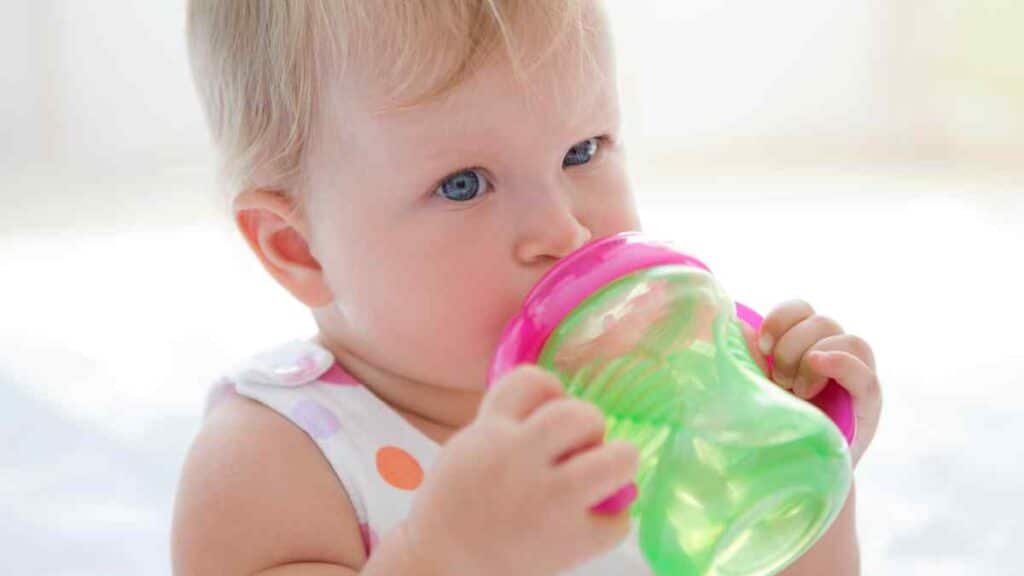
Typically, you must give your child access to drinking plain water to keep them hydrated. However, there are times when kids tend to act out, making it challenging to keep them adequately hydrated even with their favorite baby drinks. So, if you find encouraging your baby to drink water difficult, here are a few tips you can consider.
Frequent Sips are Advisable
Besides a dilute formula of cow’s milk, one effective way to let them stay hydrated is to offer small amounts of water throughout the day. You don’t need to ask them to drink 8 ounces of bottled water at once. Even a few sips from their sippy cup can already help. Meanwhile, if you want to try out diluted fruit juice, it’s highly advisable to limit their intake to 4 ounces daily, especially if you’re transitioning from breast milk or formula.
Capture Their Attention
Another way to encourage your child to drink baby water is by capturing their interest with creativity. You can make the entire process fun by introducing them to various shapes and colors. Consider using colorful straws or cups shaped like their favorite cartoon characters to get them excited.
Consider Their Activities
Children don’t have the same capability to regulate their body temperature as adults. So it’ll be much more challenging for them to cool off, especially when exposed to the hot weather or strenuous activities.
It’s essential to keep them hydrated before and after each activity. It’s best to encourage them to drink fluids during exercise. As a general rule, letting babies drink the water of 4 ounces every 20 minutes is a must. It’s a general rule to give them all the hydration without water intoxication.
Introduce Liquid Foods
Besides encouraging your child to eat solids, you can also start introducing your kids to water-rich foods after one year of age as you transition from breast milk or formula. It can be as simple as juices from undiluted fruit juice such as apples, grapes, oranges. You can also consider giving them flavor water or naturally sweetened drinks from lemon or cucumber! It’s an excellent choice if you want to let babies drink water independently.
Conclusion
Distilled water is a safe and viable option for use in baby formula, owing to its high purity and minimal contamination. It’s especially beneficial in areas with poor water quality or when the safety of tap water is questionable. However, it’s worth noting that while distilled bottled water lacks potential harmful contaminants, it also lacks beneficial minerals naturally found in water. Parents should ensure that their babies are getting these necessary nutrients from other sources.
Distilled drinking water is one of many safe options form of the purest water available for preparing baby formula, and its usage often depends on personal preference, convenience, and specific dietary needs. Other types of water such as purified, spring, or boiled tap water can also be suitable for use in baby formula, provided they meet the necessary safety standards. As always, when it comes to the health of your baby, consulting with a healthcare provider or a dietitian specializing in infant nutrition is advised to make the most informed choice. Ensuring your baby has safe, clean water is paramount in supporting their healthy growth and development.
If you have any questions, comments, or concerns, just let us know! We’re here to help.



